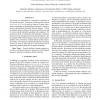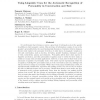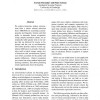255 search results - page 31 / 51 » On the use of speaker superfactors for speaker recognition |
ICASSP
2011
IEEE
12 years 11 months ago
2011
IEEE
We present our experiments in context-free recognition of non-lexical responses. Non-lexical verbal responses such as mmm-hmm or uh-huh are used by listeners to signal confirmati...
CSL
2007
Springer
2007
Springer
Speaker-adaptive learning of resonance targets in a hidden trajectory model of speech coarticulation
13 years 7 months ago
A novel speaker-adaptive learning algorithm is developed and evaluated for a hidden trajectory model of speech coarticulation and reduction. Central to this model is the process o...
JAIR
2007
13 years 7 months ago
2007
It is well known that utterances convey a great deal of information about the speaker in addition to their semantic content. One such type of information consists of cues to the s...
FEDCSIS
2011
12 years 7 months ago
2011
—The paper describes the process of designing a task-oriented continuous speech recognition system for Polish, based on CMU Sphinx4, to be used in the voice interface of a comput...
EMNLP
2006
13 years 8 months ago
2006
We analyze humorous spoken conversations from a classic comedy television show, FRIENDS, by examining acousticprosodic and linguistic features and their utility in automatic humor...



